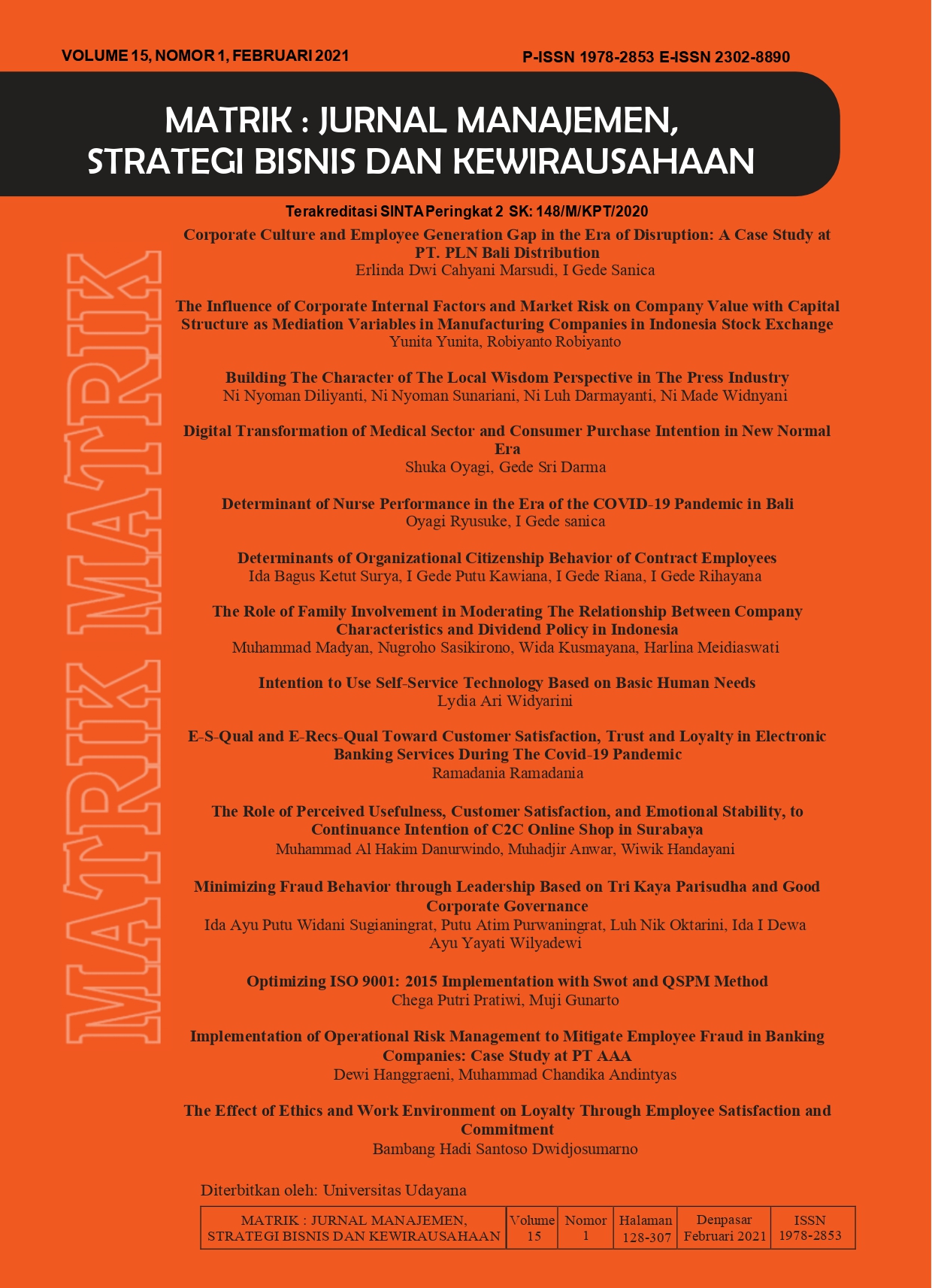The Effect of Ethics and Work Environment on Loyalty Through Employee Satisfaction and Commitment
Abstract
This study aims to prove whether work ethics and work environment variables significantly influence employee loyalty through job satisfaction and employee commitment to Nurul Hayat Surabaya employees. Data collection in this study used a questionnaire with a total sample of 75 employees at the Nurul Hayat Surabaya Foundation. Criteria for respondents in this study were employees of the Nurul Hayat Surabaya foundation who had worked more than one year. Sampling uses Non Probability Sampling with saturated sampling technique or often also called a census. This research uses a quantitative approach with SEM Partial Least Squares analysis method. Exogenous variables in this study are work ethics and work environment, mediating variables used are employee satisfaction and commitment, while the endogenous variables used are employee loyalty.
The findings of this study indicate that the intervening variable, namely job satisfaction, does not significantly influence endogenous variables, namely the employee loyalty of the Nurul Hayat Foundation in Surabaya and employee commitment has a significant effect on the endogenous variable, namely the employee loyalty of the Nurul Hayat Foundation in Surabaya. Exogenous variables of work ethics and work environment have a significant effect on endogenous variables, namely employee loyalty of Nurul Hayat Foundation, Surabaya. Suggestions for further research are expected to increase the scope of research subjects with the same characteristics of respondents.
Downloads
References
Ali, A. J., & Al-Kazemi, A. A. 2007. Islamic work ethic in Kuwait. Cross Cultural Management: An International Journal, 14(2), 93–104.
Anwar Prabu Mangkunegara. 2004. Manajemen Sumber Daya Manusia Perusahaan. Bandung: PT Remaja Rosdakarya.
Arifin, J., Fauzi, A. 2007. Aplikasi Excel dalam Aspek Kuantitatif Manajemen Sumber Daya Manusia. Jakarta: PT Elex Media Komputindo.
Chang, C. C., C. M. Chiu, et al. 2010. The effect of TQM practices on employee satisfaction and loyalty in government. Total Quality Management 21(12): 1299-1314.
Hasan, Muhammad Tolhah. 2005. Islam Dalam Persepektif Sosio kultural. Jakarta: Lantabora Press.
Herianingrum, Sri, Fitri Drasmawita, Ririn Tri Ratnasari. 2019. The Social Function of Imi’s in the Exemption of Micro Business Loans. Opcion, 35(88), 819-831.
Kirana, K.C., Ratnasari, R.T. 2017. Evaluasi Kinerja Sumber Daya Manusia (SDM). Yogyakarta: Gosyen Publishing.
Marri, M.Y.K. 2012. The Impact of Islamic Work Ethics on Job Satisfaction and Organizational Commitment: A Study of Agriculture Sector of Pakistan. IJJBBS, 2(12).
Matzler, K. and Renzl, B. 2006. The relationship between interpersonal trust, employee satisfaction, and employee loyalty. Total quality management and business excellence. Taylor & Francis, 17(10), 1261–1271.
McShane, Steven L., dan Glinow Von, Mary Ann. 2016. Organizational Behavior. 3rd edition. USA: McGrawHill.
Mustika, Hindah, Anis Eliyana, Tri Siwi Agustina, Ririn Tri Ratnasari. 2020. Knowledge Sharing Behavior Between Self-Leadership and Innovative Behavior. Journal of Security and Sustainability Issues, 9(12).
Ratnasari, Ririn Tri and Nadira Rahmandani. 2020. The Correlation of Financial Development on Energy Consumption: A Study Case in Indonesia. Test Enginearing & Management, 83, 3560-3564.
Ratnasari, Ririn Tri, Sri Gunawan, Imron Mawardi, and Kusuma Chandra Kirana. 2020. Emotional Experience on Behavioral Intention for Halal Tourism. Journal Islamic Marketing.
Ratnasari, Ririn Tri, Sri Gunawan, Dina Fitrisia Septiarini, Sylva Alif Rusmita, and Kusuma Chandra Kirana. 2020. Customer Satisfaction Between Perceptions of Environment Destination Brand and Behavioural Intention. International Journal of Innovation Creativity and Change, 10 (12).
Ratnasari, Ririn Tri, Sri Gunawan, Jasmi bin Abu Talib, Sri Herianingrum, Tika Widiastuti, and Dina Fitrisia Septiarini. 2020. The Moderating Effects of Gender between Patient Intimacy, Trust, and Loyalty. International Journal of Innovation Creativity and Change, 12 (10).
Rehman, M. U., Irum, R., Tahir, N., Ijaz, Z., Noor, U., & Salma, U. 2012. The Impact of Job Stress on Employee Job Satisfaction : A Study on Private Colleges of Pakistan. Journal of Business Studies Quarterly, 3(3), 50–56.
Robbins SP, dan Judge. 2008. Perilaku Organisasi Buku 2. Jakarta: Salemba Empat.
Santoso, Adi, Erdawati, Ririn Tri Ratnasari, Dyah Palupiningtyas, Muh. Yani Balaka. 2020. International Journal of Innovation Creativity and Change, 12 (9).
Sedianingsih, Ririn Tri Ratnasari, Ari Prasetyo, Hendarjatno. 2019. Antecedents of Recommendation and Repurchase Intention on Medical Tourism. Opcion, 35 (23), 1277-1300.
Wan and Huang, Hsieh-Hong. 2010. Effects Of Promotion On Relationship Quality And Customer Loyalty In The Airline Industry: The Relationship Marketing Approach. African Journal Of Business Management, Vol. 5 (4403-4414).
 This work is licensed under a Creative Commons Attribution-ShareAlike 4.0 International License.
This work is licensed under a Creative Commons Attribution-ShareAlike 4.0 International License.

















